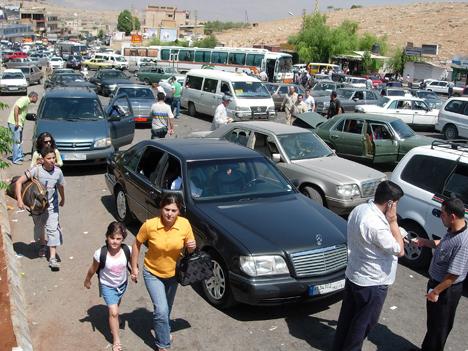Israel presents cease-fire terms

the associated press The Associated Press
July 18, 2006
WASHINGTON – After days of handwringing, telephone diplomacy and criticism of both Hezbollah and Israel, diplomatic efforts to end Israeli-Hezbollah fighting seemed to gain traction Monday, with Israeli officials saying they would agree to halt fighting if two captured soldiers were returned and Islamic guerrillas withdrew from Israel’s border with Lebanon.
On Sunday, Lebanese officials said Israel had sent the terms of a possible cease-fire through Italian mediators. The terms were the release of the Israeli soldiers and a Hezbollah pullback to roughly 20 miles from the Israeli-Lebanese border.
If a cease-fire could be arranged, an international peacekeeping force might be sent to the southern Lebanon border region. British Prime Minister Tony Blair and U.N. Secretary-General Kofi Annan have endorsed that idea.
Russian President Vladimir Putin said Moscow would consider dispatching troops, and the European Union said it also was considering a peacekeeping force.
White House spokesman Tony Snow would not pledge U.S. participation in any eventual peacekeeping force, but didn’t rule it out.
Get The Daily Illini in your inbox!
“It’s awfully premature to be talking about U.S. troops, but I just don’t know,” Snow told reporters.
A broad push for a cease-fire could put potential international peacemakers at cross purposes with the United States, traditionally the most powerful peace broker and the only power with real pull over Israel. The U.S. is leery of a quick cease-fire that could be only a temporary fix, leaving Israel and any eventual peacekeeping troops at risk.
“What you don’t want to do is … to be back in the same position three weeks from now, three months from now, six months from now, where a group of extremists, terrorists and their backers can drag the region into a crisis,” said State Department spokesman Sean McCormack.
The United States has taken an unusually hands-off approach so far, deferring to Israel as a new and militarily inexperienced leader, Prime Minister Ehud Olmert, insists he will “destroy all the terrorist infrastructure, in every place.” The U.S. blames Hezbollah and its Syrian and Iranian backers.
“I think this is a very simplistic approach to things,” said Syria’s ambassador in Washington, Imad Moustapha, in an interview with APTV. “You know what? History did not start six days ago. This is an ongoing conflict.”
Olmert said Monday the fighting in Lebanon would end when the two Israeli soldiers captured by Hezbollah guerrillas were freed, rocket attacks on Israel stopped and the Lebanese army was deployed along the border.
“Israel will not agree to live in the shadow of the threat of missiles or rockets against its residents,” he told the Knesset, Israel’s legislature.






